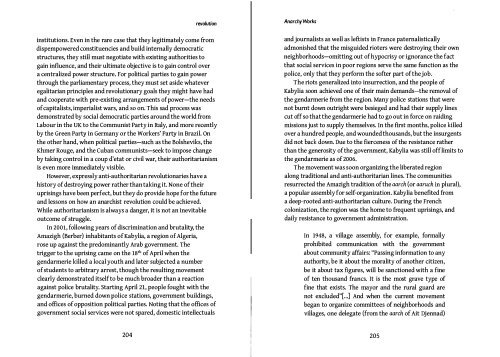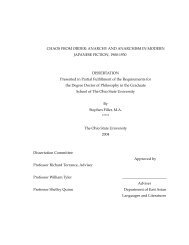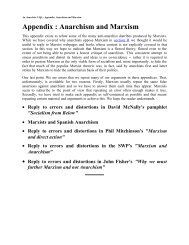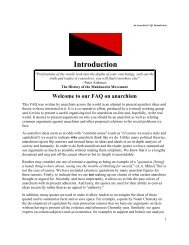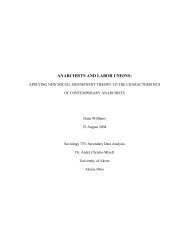Anarchy Works.pdf - Infoshop.org
Anarchy Works.pdf - Infoshop.org
Anarchy Works.pdf - Infoshop.org
Create successful ePaper yourself
Turn your PDF publications into a flip-book with our unique Google optimized e-Paper software.
evolution<br />
Anorchy <strong>Works</strong><br />
institutions. Even in the rare case that they legitimately come from<br />
dispempowered constituencies and build internally democratic<br />
structures, they still must negotiate with existing authorities to<br />
gain influence, and their ultimate objective is to gain control over<br />
a centralized power structure. For political parties to gain power<br />
through the parliamentary process, they must set aside whatever<br />
egalitarian principles and revolutionary goals they might have had<br />
and cooperate with pre-existing arrangements of power-the needs<br />
of capitalists, imperialist wars, and so on. This sad process was<br />
demonstrated by social democratic parties around the world from<br />
Labour in the UK to the Communist Party in Italy, and more recently<br />
by the Green Party in Germany or the workers' Party in Brazil. On<br />
the other hand, when political parties-such as the Bolsheviks, the<br />
Khmer Rouge, and the Cuban communists-seek to impose change<br />
by taking control in a coup d'etat or civil war, their authoritarianism<br />
is even more immediately visible.<br />
However, expressly anti-authoritarian revolutionaries have a<br />
history of destroying power rather than taking it. None of their<br />
uprisings have been perfect, but they do provide hope for the future<br />
and lessons on how an anarchist revolution could be achieved.<br />
While authoritarianism is always a danger, it is not an inevitable<br />
outcome of struggle.<br />
In 2001, following years of discrimination and brutality, the<br />
Amazigh (Berber) inhabitants ofKabylia, a region of Algeria,<br />
rose up against the predominantly Arab government. The<br />
trigger to the uprising came on the 18t h of April when the<br />
gendarmerie killed a local youth and later subjected a number<br />
of students to arbitrary arrest, though the resulting movement<br />
clearly demonstrated itself to be much broader than a reaction<br />
against police brutality. Starting April 21, people fought with the<br />
gendarmerie, burned down police stations, government buildings,<br />
and offices of opposition political parties. Noting that the offices of<br />
government social services were not spared, domestic intellectuals<br />
and journalists as well as leftists in France paternalistically<br />
admonished that the misguided rioters were destroying their own<br />
neighborhoods-omitting out of hypocrisy or ignorance the fact<br />
that social services in poor regions serve the same function as the<br />
police, only that they perform the softer part of the job.<br />
The riots generalized into insurrection, and the people of<br />
Kabylia soon achieved one of their main demands-the removal of<br />
the gendarmerie from the region. Many police stations that were<br />
not burnt down outright were besieged and had their supply lines<br />
cut off so that the gendarmerie had to go out in force on raiding<br />
missions just to supply themselves. In the first months, police killed<br />
over a hundred people, and wounded thousands, but the insurgents<br />
did not back down. Due to the fierceness of the resistance rather<br />
than the generosity of the government, Kabylia was still off limits to<br />
the gendarmerie as of 2006.<br />
The movement was soon <strong>org</strong>anizing the liberated region<br />
along traditional and anti-authoritarian lines. The communities<br />
resurrected the Amazigh tradition of the aarch (or aaruch in plural),<br />
a popular assembly for self-<strong>org</strong>anization. Kabylia benefited from<br />
a deep-rooted anti-authoritarian culture. During the French<br />
colonization, the region was the home to frequent uprisings, and<br />
daily resistance to government administration.<br />
In 1948, a village assembly, for example, formally<br />
prohibited communication with the government<br />
about community affairs: "Passing information to any<br />
authority, be it about the morality of another citizen,<br />
be it about tax figures, will be sanctioned with a fine<br />
of ten thousand francs. It is the most grave type of<br />
fine that exists. The mayor and the rural guard are<br />
not excluded"[ ... ] And when the current movement<br />
began to <strong>org</strong>anize committees of neighborhoods and<br />
villages, one delegate (from the aarch of Ait Dj ennad)<br />
204<br />
205


